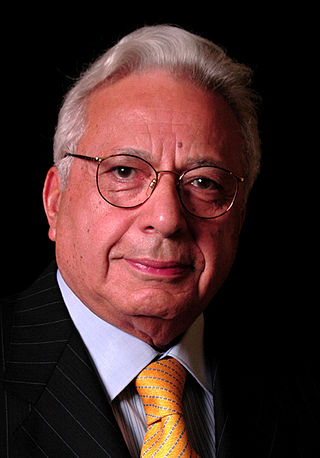A mental disorder, also referred to as a mental illness or psychiatric disorder, is a behavioral or mental pattern that causes significant distress or impairment of personal functioning. A mental disorder is also characterized by a clinically significant disturbance in an individual's cognition, emotional regulation, or behavior. It is usually associated with distress or impairment in important areas of functioning. There are many different types of mental disorders. Mental disorders may also be referred to as mental health conditions. Such features may be persistent, relapsing and remitting, or occur as single episodes. Many disorders have been described, with signs and symptoms that vary widely between specific disorders. Such disorders may be diagnosed by a mental health professional, usually a clinical psychologist or psychiatrist.
Anti-psychiatry, sometimes spelled antipsychiatry, is a movement based on the view that psychiatric treatment is often more damaging than helpful to patients, highlighting controversies about psychiatry. Objections include the reliability of psychiatric diagnosis, the questionable effectiveness and harm associated with psychiatric medications, the failure of psychiatry to demonstrate any disease treatment mechanism for psychiatric medication effects, and legal concerns about equal human rights and civil freedom being nullified by the presence of diagnosis. Historically critiques of psychiatry came to light after focus on the extreme harms associated with electroconvulsive treatment or insulin shock therapy. The term "anti-psychiatry" is in dispute and often used to dismiss all critics of psychiatry, many of whom agree that a specialized role of helper for people in emotional distress may at times be appropriate, and allow for individual choice around treatment decisions.
Sluggish schizophrenia or slow progressive schizophrenia was a diagnostic category used in the Soviet Union to describe what was claimed to be a form of schizophrenia characterized by a slowly progressive course; it was diagnosed even in patients who showed no symptoms of schizophrenia or other psychotic disorders, on the assumption that these symptoms would appear later. It was developed in the 1960s by Soviet psychiatrist Andrei Snezhnevsky and his colleagues, and was used exclusively in the USSR and several Eastern Bloc countries, until the fall of Communism starting in 1989. The diagnosis has long been discredited because of its scientific inadequacy and its use as a means of confining dissenters. It has never been used or recognized outside of the Soviet Union, or by international organizations such as the World Health Organization. It is considered a prime example of the political abuse of psychiatry in the Soviet Union.
Professor Christos Pantelis is an Australian professor of medicine who is the Director of the Melbourne Neuropsychiatry Centre.

Philosophy, Psychiatry, & Psychology is an academic journal founded in 1993 and the official publication of the Association for the Advancement of Philosophy and Psychiatry (AAPP) which fosters close associations with the American Psychiatric Association. The journal focuses on the overlap of philosophy, psychiatry, and abnormal psychology. It aims to make clinical material accessible to philosophers while advancing philosophical inquiry into the area of psychology. It includes book reviews, original works, and a variety of special columns.
Samuel Barry Guze was an American psychiatrist, medical educator, and researcher. A graduate of City College of New York and Washington University School of Medicine, he was an influential psychiatrist. He worked at the Washington University School of Medicine in St. Louis for most of his career. In addition to twice serving as department chair, he led the School of Medicine as Vice Chancellor for Medical Affairs (1971-1989).

Vladimir Petrovich Serbsky was a Russian psychiatrist and one of the founders of forensic psychiatry in Russia. The author of The Forensic Psychopathology, Serbsky thought delinquency to have no congenital basis, considering it to be caused by social reasons.
The classification of mental disorders, also known as psychiatric nosology or psychiatric taxonomy, is central to the practice of psychiatry and other mental health professions.
Pierre Flor-Henry is a Canadian psychiatrist, researcher, lecturer, and professor. His most important initial contribution was the demonstration in the study of epileptic psychosis, that schizophrenia relates to left and manic-depressive states relate to right hemisphere epilepsies.

Michael Shepherd, CBE, FRCP, FRCPsych (Hon), FAPA (Corr), FAPHA was one of the most influential and internationally respected psychiatrists of his time, formerly Professor of Epidemiological Psychiatry, Institute of Psychiatry and Consultant Psychiatrist, The Maudsley Hospital, London and author of a number of influential publications in the field of psychiatry, including the seminal work Psychiatric Illness in General Practice.
Psychiatry is the medical specialty devoted to the diagnosis, prevention, and treatment of deleterious mental conditions. These include various matters related to mood, behaviour, cognition, and perceptions.

Ahmed Okasha is an Egyptian psychiatrist. He is a professor of psychiatry at Ain Shams University Faculty of Medicine, Cairo, Egypt. He wrote books and articles about psychiatry and mental disorders. He is the first Arab-Muslim to be president of World Psychiatric Association from 2002 to 2005.

Jeffrey Alan Lieberman is an American psychiatrist who specializes in schizophrenia and related psychoses and their associated neuroscience (biology) and pharmacological treatment. He was principal investigator for CATIE, the largest and longest independent study ever funded by the United States National Institute of Mental Health to examine existing pharmacotherapies for schizophrenia. He was president of the American Psychiatric Association from May 2013 to May 2014.
John Charles Cutting is a British psychiatrist specialising in schizophrenia research. He has written a number of books, and articles and reviews in professional journals, on the subjects of psychiatry, clinical psychology, schizophrenia and the functioning of the right cerebral hemisphere of the brain.
The diagnosis of schizophrenia, a psychotic disorder, is based on criteria in either the American Psychiatric Association's Diagnostic and Statistical Manual of Mental Disorders, or the World Health Organization's International Classification of Diseases (ICD). Clinical assessment of schizophrenia is carried out by a mental health professional based on observed behavior, reported experiences, and reports of others familiar with the person. Diagnosis is usually made by a psychiatrist. Associated symptoms occur along a continuum in the population and must reach a certain severity and level of impairment before a diagnosis is made. Schizophrenia has a prevalence rate of 0.3-0.7% in the United States
Norman Sartorius is a German-Croatian psychiatrist and university professor. Sartorius is a former director of the World Health Organization's (WHO) Division of Mental Health, and a former president of the World Psychiatric Association and of the European Psychiatric Association. He has been described as "one of the most prominent and influential psychiatrists of his generation" and as "living legend"
The following outline is provided as an overview of and topical guide to psychiatry:

The Center for Subjectivity Research (CFS) is an interdisciplinary research center at the University of Copenhagen, directed by Dan Zahavi. They work on a number of different topics: subjectivity, intentionality, empathy, action, perception, embodiment, naturalism, self-consciousness, self-disorders, schizophrenia, autism, cerebral palsy, normativity, anxiety, and trust, and do scholarly work on classical thinkers such as Kant, Hegel, Kierkegaard, Brentano, Husserl, Heidegger, Wittgenstein, Merleau-Ponty, Levinas, and Ricoeur. They put a variety of philosophical and empirical perspectives on subjectivity into play to obtain mutual enlightenment, and methodological and conceptual pluralism. Hence, they have had collaborations within different disciplines such as phenomenology, analytic philosophy, hermeneutics, psychiatry, neuroscience, philosophy of religion, Asian philosophy, developmental psychology, clinical psychology, and cognitive science.
Psychiatry is, and has historically been, viewed as controversial by those under its care, as well as sociologists and psychiatrists themselves. There are a variety of reasons cited for this controversy, including the subjectivity of diagnosis, the use of diagnosis and treatment for social and political control including detaining citizens and treating them without consent, the side effects of treatments such as electroconvulsive therapy, antipsychotics and historical procedures like the lobotomy and other forms of psychosurgery or insulin shock therapy, and the history of racism within the profession in the United States.
Femi Oyebode is a retired Professor and Head of Department of Psychiatry at the University of Birmingham. He has investigated the relationships between literature and psychiatry. His research has considered descriptive psychopathology and delusional misidentification syndrome. He was awarded the 2016 Royal College of Psychiatrists lifetime achievement award.






